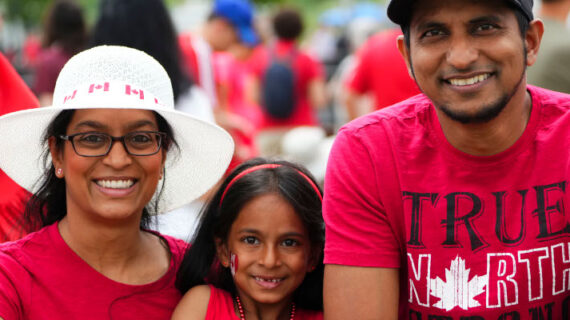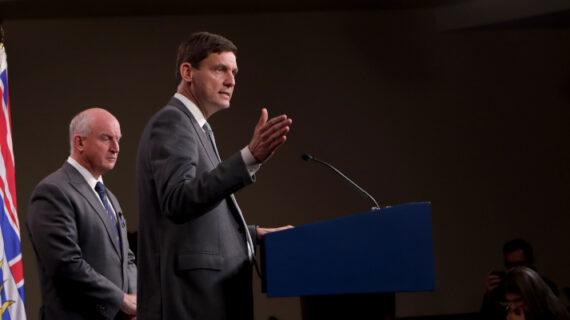With Canada Day around the corner, it’s natural to reflect on our country’s national identity—or lack thereof. When I was a kid getting a flag painted on my cheek at the community centre, my parents and their peers were thinking about Quebec separatism and Western alienation. Jean Charest tried to channel this version of national identity crisis into a successful Conservative party leadership bid, but he proved that while nationalism is still a driving force in Quebec politics and Western alienation continues to energize voters in Alberta, our country’s current identity crisis is about something different.
Pierre Poilievre came closer by targeting cancel culture and defending our shared history, but even that doesn’t feel up to the task of salvaging an eroding Canadian identity. At the height of the global pandemic, when truckers from rural British Columbia clashed with public servants from Westboro, and our own prime minister was stoking the flames of division, it became clear these Canadians had no shared experience to refer to—not even a common language with which to start a conversation. Post-COVID, Canadians have never been lonelier, our economy is desperate for labour, we can’t get anything built, and we’re struggling to care for our young and our old.
What if we could build a common identity, inculcate a shared national vision, and address some of our economy’s biggest challenges all at once? Eighteen-year-old Canadians should be required to perform a mandatory year of service—in the military or caring for seniors or children. They should be encouraged to serve in a place they didn’t grow up in and meet people different from themselves. It could bolster our ailing military, inject long-term care homes and childcare centres with the labour they desperately need, increase birth rates, and cure loneliness. And it would give us something meaningful to celebrate on Canada Day: a shared national identity.
As a matter of public policy, mandatory service is almost always contemplated in the context of military conscription. And it’s worth considering the case of Israel. If you’ve travelled the country, you’ve no doubt encountered groups of teenagers in army fatigues, looking like they’re experiencing a right-of-passage akin to summer camp. And while mandatory military service is rather more existential for a country under constant threat of attack from its neighbours, it’s worth looking at what other impacts the program has had beyond strong defence forces. Israel’s birth rate is almost double Canada’s, it punches above its weight on innovation, and it tends to score high on measures of happiness and longevity. It’s not hard to imagine how the effect of most of the country’s population joining together in training and mission at the cusp of adulthood would strengthen social bonds.
And it’s not like Canada’s military couldn’t use the boost. We haven’t met our NATO spending obligations in years and our armed forces are facing a worsening recruitment challenge, seemingly unable to attract young Canadians to opt voluntarily into service. Imagine the boost mandatory service could give our military, and the pride young people would feel having contributed to their country’s strength on the world stage.
And service to country doesn’t have to just mean military. For a wealthy country, we struggle to adequately care for our eldest and our youngest. Long-term care homes and home care providers across the country are facing chronic labour shortages and provinces are struggling to meet childcare demand. A lot of the need in health care is for highly skilled labour, but some of the demand for care could be filled by eager young people with minimal training, particularly if we remove artificial credential barriers where they’re unnecessary. Not everyone who helps to care for kids needs to be an early childhood educator and we learned through the pandemic that those caring for seniors benefit from staff with even just a small amount of training.

If we tapped into 18-year-olds across the country, not only could we urgently meet some short-term labour demands, but some may also learn they have a passion for caring and go on to upskill, supplying the country with more trained nurses, doctors, and teachers. Beyond our economic need for caregiving labour, Canada, like so many other developed Western countries, is facing a loneliness epidemic, acute among seniors, and a mental health crisis, acute among young people. It’s not hard to imagine that more time spent with young people might alleviate some loneliness among the aged, while more in-real-life time spent with elders might lessen some of the smartphone-exacerbated mental health challenges faced by Canadian teens.
There are no doubt other areas of Canadian society that could use a year of commitment from our young people—construction of public infrastructure, firefighting, and flood prevention, maybe even tree planting—but what’s important is the service, the shared experience, and the national mission. It’s an ambitious idea, and there’s certainly no shortage of practical reasons it wouldn’t work. It would be expensive (though we did just spend $16 billion on a car battery plant), logistically complicated, and might exacerbate private-sector labour shortages.
But it could be worth it, particularly if the program is designed to maximize social cohesion, sending urban kids to rural environments and vice versa. Conservatives balked when Prime Minister Trudeau said he thought Canada had no “core identity”. But do we? Not only do Canadians today seem to lack knowledge of and respect for our shared history, we seem to lack a sense of anything shared at all. This Canada Day it’s worth considering, wouldn’t we be stronger as a country if we had a plan to work on that?




